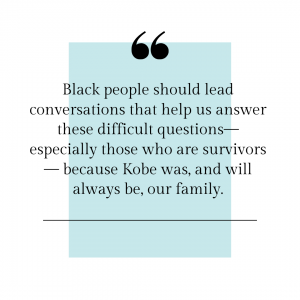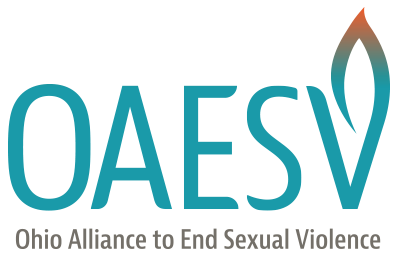For Us, By Us: (Un)Complicating the Legacy of Kobe Bryant
Many of us are grappling with complex emotions this week as we honor the life and legacy of Kobe Bryant. We are recognizing that there is the celebration of a man, a man who was influential and inspired positivity across communities and across generations. When faced with death, we often begin to consider our own morality; how we love, how we live, who we honor, who we protect, and if we are making the most of our time on this planet. Death creates opportunity for deep reflection, and in this time, we find we must reflect on Kobe and his life in its entirety. His legacy was full of life, celebration, positivity, love, and also violence.
 How can we reckon with the juxtaposition of mourning someone who did great things, perfected his craft and as an African American man, was a positive role model publicly, but who had also been accused of sexual violence?
How can we reckon with the juxtaposition of mourning someone who did great things, perfected his craft and as an African American man, was a positive role model publicly, but who had also been accused of sexual violence?
What many of us are grappling with is the intersectionality of being African American and at the same time, caring about and largely representing sexual violence survivors. In this movement, we walk the fine line of 1 in 3 black men being incarcerated in their lifetimes and 1 in 4 black girls experiencing violence before they turn 18. One thought that came to the forefront was wanting to hold space for Kobe Bryant. For he was a source of healing for so many and also a source of harm for many, as well. Sexual violence has long been used as a source of harm to the Black community and the effects of it run very deep. We are seeing health outcomes today that are the result of violence against the Black community that occurred long before we were born. The idea of Black women coming second to Black men’s needs who appear to come first, are historical and intersectional.
Outwardly facing, Black men face overwhelming violence from oppressive institutions as well as individuals. Less visibly, Black women face an egregious amount of violence as well. It can be easy to fall into the innate reaction of protecting Kobe Bryant and that is O.K. What we also need to discuss is that by doing so, we are reinforcing the ideology that his protection is more important than the liberation of survivors. We need to hold space for ourselves to sit in the middle of loving and protecting this incredible man and also, acknowledging that our community will do better in centering the protection and respect of Black women.
How do we ask for accountability simultaneously while being in mourning? How can we mourn a tragic loss while also holding space for survivors?
In the African American community, we have social ties to one another within our culture called fictive kinship. Fictive kinship is essentially the experience or understanding that we are all family and that most of us are kinfolk. Historically, state institutions have used the separation of black families as a form of control and abuse. Our community pushed back against that violence by creating these fictive kinship relationships. We have a sense of community that surpasses DNA ties. This can look like finding and bonding with other Black people in white spaces. It’s an act of resilience and community coping. Each of our individual experiences impact the perception of all of us, especially when we exist in public spheres.
Another theme that continues to arise is the anti-blackness that occurs when outside communities use this as an opportunity to tear down the character of a Black man. Our kinship is meant to bond us together, but outside communities (and even individuals within the Black community) often weaponize these bonds into generalizations that can feel like assaults against our characters, reputations, and legacies, which ultimately may feel like a hinderance to our overall progression. We must always remember however that oppressive systems such as patriarchy, white supremacy, and classism are truly responsible for the violence we experience.
It is crucial that we center the voices of those who are within the African American communal family before others take the stage to share their own opinion or perspective. Black people should lead conversations that help us answer these difficult questions—especially those who are survivors— because Kobe was, and will always be, our family.
This may seem like an immense request, but it is necessary. Many of our family structures have closed or strict boundaries around serious deliberations between family members. We need to have the ability to dis/agree amongst one another in peace and the parties who are impacted the most should be centered and have their voices heard first. Those outside of the family are not welcome or entitled to offer resolution without invitation.
It should be our voices who dominate the narratives, who lead the discussions on restorative justice, transformative justice, what grieving and mourning could or should look like.
We need to dialogue about restoration because justice and finding peace cannot always be rooted in death. More precisely, we cannot continue to illustrate an expectation that justice is the death of a Black man. This is an opportunity to discuss grief, mental health, sexual violence, and love among many of our people who are feeling the effects of losing an idol. We have an opportunity to become leaders in finding resolutions for ending violence without violence.
It matters the extension of grace and care we offer one another while we are still here. This is where we will find liberation and healing.
